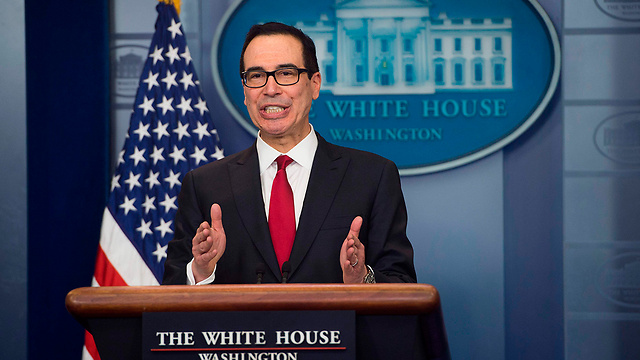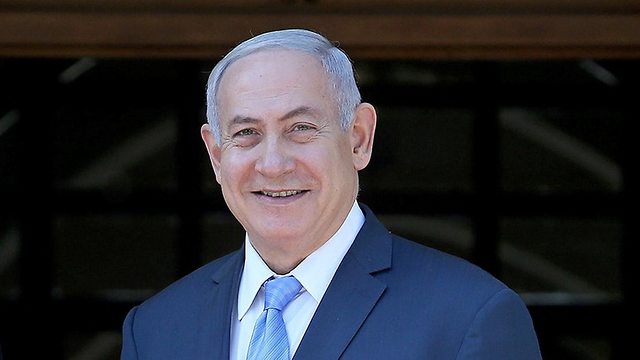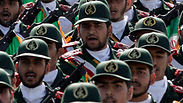
The Revolutionary Guard's Quds Force
Photo: AP

US makes good on threat, sanctions Iranian Quds Force
First series of sanctions imposed by US on 6 people, 3 Iranian companies suspected of funneling funds to Revolutionary Guard's elite Quds Force; 'Iranian regime, its Central Bank have abused access to entities in UAE to acquire US dollars to fund IRGC-QF's malign activities,' US Sect. of State Mnuchin says.
The US Treasury imposed sanctions on Thursday against six individuals and three companies it said had funneled millions of dollars to the Iranian Revolutionary Guard's elite Quds Force, just days after President Donald Trump withdrew from the landmark 2015 Iran nuclear deal.
The Treasury Department said it was acting with the United Arab Emirates to disrupt the network and accused Iran's central bank of actively helping the group to access US dollars held in foreign bank.
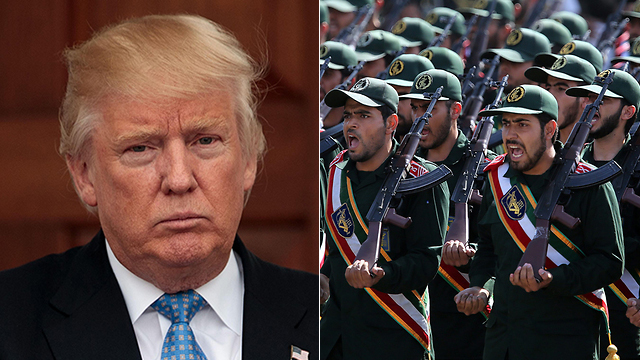
Following President Trump's withdrawal from the nuclear deal, Iran's Quds Force was hit with new sanctions (Photo: EPA, AFP)
"The Iranian regime and its Central Bank have abused access to entities in the UAE to acquire US dollars to fund the IRGC-QF's malign activities, including to fund and arm its regional proxy groups, by concealing the purpose for which the US dollars were acquired," Mnuchin said in a statement.
The six individuals and three entities were sanctioned under US regulations targeting specially designated global terrorist suspects and Iranian financial activity, the Treasury said.
The crackdown comes two days after Trump withdrew from the 2015 arms accord and as US Secretary of State Mike Pompeo pushes allies in Europe, Asia and the Middle East to pressure Iran to return to negotiations over its nuclear and missile programs.
Trump's decision has given grace periods of 90 days to six months for companies to wind down their trade with Iran.
In February 2015, Reuters reported that at least $1 billion in cash had been smuggled into Iran despite US and other sanctions. Before it reached Iran, the cash was passed through money changers and front companies in Dubai, in the United Arab Emirates, and Iraq, sources told Reuters.
The report said Iran's central bank had worked with other entities, including sanctioned Iranian companies, to find ways to obtain US dollars, including using front companies and their networks. They said the central bank had given the orders to the front companies abroad to buy dollars.
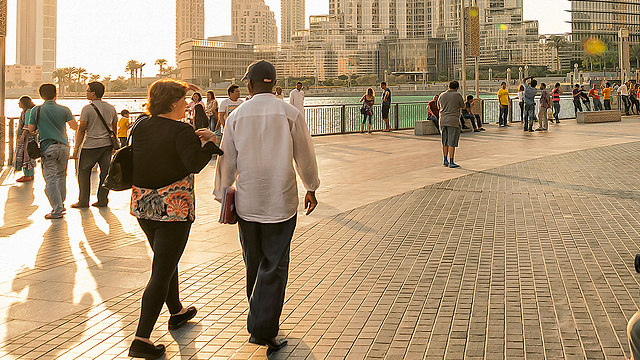
Dubai. Front companies mushroomed in the Gulf country to facilitate payments, the US said (Photo: Shutterstock)
Before the 2015 nuclear deal was reached, front companies had mushroomed in Dubai to facilitate payments to Iran. The use of multiple front companies, which bought dollars from currency traders in Dubai and Iraq, was preferred as it concealed the overall size of the dollar purchasing operation.
The Islamic republic's official government newspaper "Iran" reported Wednesday that officials feared that following the US withdrawal and re-imposition of sanctions, contracts signed between Iran and Airbus and Boeing aircraft manufacturers will be canceled.
Thanks to the nuclear deal's relief measures, Iran was able to ink a purchasing contract for 100 planes with Airbus worth 19 billion dollars, and a similar agreement with Boeing for 110 planes worth 19.6 billion dollars.
President Trump called the nuclear deal "horrible, (a) one-sided deal that should have never, ever been made. It didn’t bring peace, and it never will."
President Trump's statement on withdrawal from nuclear deal
The president added that the deal, which he said was an "embarrassment," might have been renegotiated that same year, but it was not. At the heart of the deal, he maintained, was "a giant fiction that a murderous regime desired only a peaceful nuclear energy program."
"In a few moments," Trump continued, "I will sign a presidential memorandum to begin reinstating US nuclear sanctions on the Iranian regime. We will be instituting the highest level of economic sanction. Any nation that helps Iran in its quest for nuclear weapons could also be strongly sanctioned by the United States."
Commenting on the American decision to withdraw from the accord, Prime Minister Benjamin Netanyahu called the decision "correct, wise and courageous."
"Had the deal remained in place," Netanyahu continued, "it would have allowed Iran to enrich enough uranium within the span of a few years to create an entire arsenal of nuclear bombs."
"In addition, the deal has already funneled Iran billions of dollars to finance its war machine throughout the Middle East," the premier added.
"That's what it does today, when it does not possess a nuclear arsenal, and I ask you to consider what it might do when it attains one," he said ominously.














